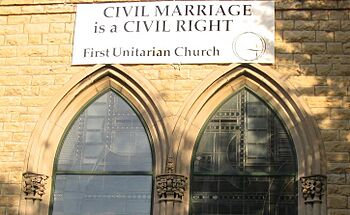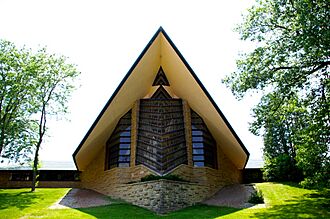Unitarian Universalism facts for kids
Quick facts for kids Unitarian Universalism |
|
|---|---|

An early logo of the Unitarian Universalist Association which includes a flaming chalice, its most widely used symbol
|
|
| Abbreviation | UUism |
| Classification | Liberal religion |
| Orientation | Mix of Humanist, Pluralist, Protestant, Restorationist, and Religious Liberals |
| Scripture | Officially none |
| Founder | Members of the American Unitarian Association and the Universalist Church of America via consolidation |
| Origin | May 1961 |
| Congregations | 1,048 worldwide |
| Number of followers | 148,232 members of Unitarian Universalist Association congregations in the United States; 800,000 identify as Unitarian Universalist worldwide (including the U.S.). |
Unitarian Universalism (often called UUism or UU) is a liberal religious faith. It is known for welcoming people with many different beliefs and for its work on social justice issues. Unitarian Universalists do not have a single set of required beliefs. Instead, they are united by shared promises to support each other and live by values like love and respect.
People who are Unitarian Universalists have a wide range of beliefs. The faith grew out of Christianity, but today people draw wisdom from many sources. These include religious humanism, Judaism, Buddhism, atheism, agnosticism, and many other world religions and philosophies. UUs believe in the freedom to think for themselves and in showing love to all people.
Unitarian Universalism was formed in 1961. It was created when two older religious groups, the American Unitarian Association and the Universalist Church of America, joined together. The main organization in the United States is the Unitarian Universalist Association (UUA), based in Boston, Massachusetts.
Contents
History of Unitarian Universalism
Unitarian Universalism was created in 1961 by joining two different Christian groups: the Universalist Church of America and the American Unitarian Association. Both of these groups started in North America and had roots in liberal Christian ideas. Over time, they grew to include ideas from many different religions and philosophies.
Universalism
Universalists believe in universal salvation. This is the idea that a loving God would not punish people forever. Instead, they believe that every person will eventually be saved and reconciled with God.
This idea has been around for a long time, but Universalism became its own Christian group in the United States in 1793. Early leaders like Hosea Ballou and John Murray taught that all souls would find salvation. They believed in a completely loving God who would ultimately save everyone.
Unitarianism
Unitarians got their name from their belief in a "unitary" God, meaning God is one being. This was different from the traditional Christian belief in the Trinity (God as Father, Son, and Holy Spirit). A Spanish doctor named Michael Servetus was an early thinker who wrote that the Trinity was not in the Bible. He was executed for his beliefs in 1553.
Unitarian churches were first started in Poland and Transylvania (a region in modern-day Romania) in the 1500s. These early churches also rejected other traditional ideas, like original sin. They believed that Jesus was a special human being with a unique connection to God.
Unitarianism in Great Britain
In Great Britain, Unitarian ideas spread in the 1700s. Ministers like Theophilus Lindsey changed church services to remove references to the Trinity. In 1774, Lindsey opened the first official Unitarian church in London. Famous people like the scientist Joseph Priestley and American leader Benjamin Franklin attended. Priestley later moved to America and helped start the church there.
Unitarianism in the United States
In the United States, the Unitarian movement grew out of the Congregational churches in New England. These churches were started by the Puritans. Over time, some members began to question traditional beliefs like the Trinity.
In 1819, a famous sermon by William Ellery Channing clearly explained Unitarian ideas. This led to the creation of the American Unitarian Association as a separate religious group in 1825. Later, thinkers like Ralph Waldo Emerson helped Unitarianism become more open to a wider range of ideas beyond Christianity.
Beliefs and Values
Unitarian Universalism is a religion that values freedom, reason, and acceptance. It is a "non-creedal" religion, which means members are not required to believe in any specific doctrine. Instead, UUs are united by a shared history and a promise to support each other's spiritual journeys.
A Wide Range of Beliefs
UUs are encouraged to explore their own spiritual paths. They can draw wisdom from many world religions, science, nature, and art. Many UUs see their faith as compatible with other beliefs. For example, a person can be a Buddhist and a Unitarian Universalist at the same time.
Humanism and Views on God
Because UUism grew out of Christianity, early members had specific ideas about God. Today, however, UUs have many different views. Some are theists (believe in God or gods), while others are atheists (do not believe in God) or agnostics (are unsure).
Many UUs identify as religious humanists. Humanism focuses on human values, reason, and the natural world. It encourages people to find awe and wonder in the world around them and to recognize that all living things are connected.
Covenants: Promises We Make
Instead of a creed, UUs use covenants. A covenant is a promise that people in a community make to each other about how they will act. These promises help build trust and create a safe and caring community. Covenants are about how people treat each other, not what they must believe.
Principles and Values
In the United States, members of the Unitarian Universalist Association (UUA) are guided by shared values. For many years, these were known as the Seven Principles.
In June 2024, the UUA voted to adopt a new covenant based on seven core values. These values are:
- Love: The central value that guides all others.
- Interdependence: Respect for the connected web of all existence.
- Equity: Working for fairness and justice for all people.
- Transformation: A commitment to personal and spiritual growth.
- Pluralism: Welcoming people with many different beliefs and identities.
- Generosity: A spirit of giving and sharing.
- Justice: The work of creating a more fair and peaceful world.
These values help guide UUs in their personal lives and in their work for a better world.
Worship and Community Life
UU congregations can be called "churches," "fellowships," or "societies." Worship services and community practices can be very different from one congregation to another.
The Flaming Chalice Symbol
The most common symbol of Unitarian Universalism is the flaming chalice. It was first used by the Unitarian Service Committee during World War II to help people escape from danger. The burning flame inside the cup is often seen as a symbol of help, sacrifice, and truth. Many UU congregations light a chalice at the start of their worship services.
Worship Services
UU services are often held on Sundays. They usually include music, hymns, and a sermon or talk from a minister or guest speaker. The sermon can be about many topics, drawing from different religions, science, or personal experiences.
Services often include a time for people to share their personal joys and sorrows. There may also be time for quiet meditation or prayer. Many congregations have religious education classes for children and teens, where they learn about different world religions and explore their own beliefs.
Instead of traditional Christian ceremonies like baptism, UUs often have "child dedications." They also have special annual traditions like the "Flower Communion," where everyone brings a flower to share, and the "Water Communion," where people bring a small amount of water from a meaningful place.
Working for Justice
Unitarian Universalists believe that actions are more important than beliefs. A common saying is "Deeds, not creeds." This means that working to make the world a better place is a core part of their faith.
Historical Work for Social Reform

Throughout history, Unitarians and Universalists have been active in social reform. In the 19th century, they worked to end slavery, supported the right of women to vote, and pushed for other social changes. Four U.S. presidents were Unitarians: John Adams, John Quincy Adams, Millard Fillmore, and William Howard Taft.
Modern Political Action
Today, UUs continue to be involved in political causes. They are active in movements for civil rights, LGBTQ+ rights, and environmental justice.
- Civil Rights: UUs were very involved in the American Civil Rights Movement. They marched for voting rights and worked to end racism.
- LGBTQ+ Rights: The UUA was one of the first major religious groups to support same-sex unions in 1984. UU ministers perform same-sex marriages, and many congregations are officially recognized as "Welcoming Congregations" for LGBTQ+ people.
- Environmental Justice: Many congregations work on projects to protect the environment. This work is often called "seventh principle" activity, based on the principle of respecting the interdependent web of all existence.
While many UUs are politically liberal, the faith officially welcomes people of all political views.
Organizations
Unitarian Universalism is a global faith with organizations around the world.
- The Unitarian Universalist Association (UUA) is the main organization in the United States.
- The Canadian Unitarian Council (CUC) is the national organization for UUs in Canada.
- The International Council of Unitarians and Universalists (ICUU) was an organization that connected UU groups worldwide until 2021.
- There are also UU groups in Europe, Asia, Africa, and Australia.
Some groups within UUism focus on specific interests, such as:
- Covenant of Unitarian Universalist Pagans (CUUPS) for UUs who identify as Pagan.
- Unitarian Universalist Christian Fellowship (UUCF) for UUs who identify as Christian.
- Unitarian Universalist Service Committee (UUSC), which works on human rights issues around the world.
Images for kids
-
Ibram X. Kendi presenting his book How to Be an Antiracist at a Unitarian Universalist Church in Montclair, New Jersey, on August 14, 2019.
See also
 In Spanish: Unitarismo universalista para niños
In Spanish: Unitarismo universalista para niños
- List of Unitarian, Universalist, and Unitarian Universalist churches
- Postchristianity
- United Church of Christ
 | Misty Copeland |
 | Raven Wilkinson |
 | Debra Austin |
 | Aesha Ash |



